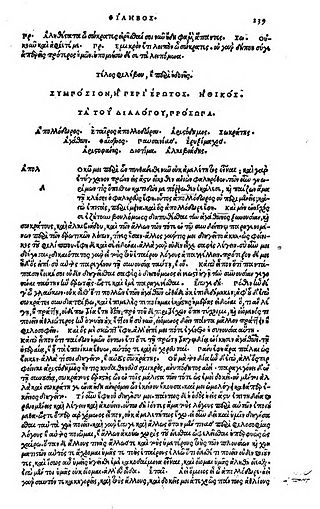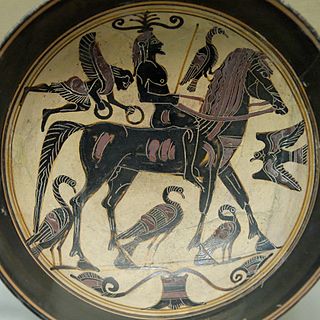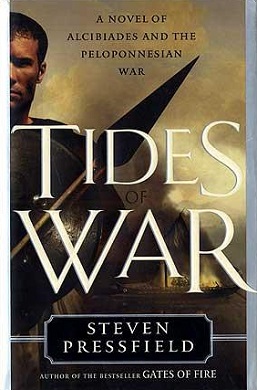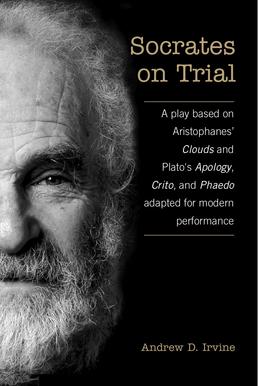The Trial of Socrates was held to determine the philosopher's guilt of two charges: asebeia (impiety) against the pantheon of Athens, and corruption of the youth of the city-state; the accusers cited two impious acts by Socrates: "failing to acknowledge the gods that the city acknowledges" and "introducing new deities".

Alcibiades was an Athenian statesman and general. The last of the Alcmaeonidae, he played a major role in the second half of the Peloponnesian War as a strategic advisor, military commander, and politician, but subsequently fell from prominence.

The Clouds is a Greek comedy play written by the playwright Aristophanes. A lampooning of intellectual fashions in classical Athens, it was originally produced at the City Dionysia in 423 BC and was not as well received as the author had hoped, coming last of the three plays competing at the festival that year. It was revised between 420 and 417 BC and was thereafter circulated in manuscript form.

Aspasia was a metic woman in Classical Athens. Born in Miletus, she moved to Athens and began a relationship with the statesman Pericles, with whom she had a son named Pericles the Younger. According to the traditional historical narrative, she worked as a courtesan and was tried for asebeia (impiety), though modern scholars have questioned the factual basis for either of these claims, which both derive from ancient comedy. Though Aspasia is one of the best-attested women from the Greco-Roman world, and the most important woman in the history of fifth-century Athens, almost nothing is certain about her life.

The Symposium is a Socratic dialogue by Plato, dated c. 385 – 370 BC. It depicts a friendly contest of extemporaneous speeches given by a group of notable Athenian men attending a banquet. The men include the philosopher Socrates, the general and statesman Alcibiades, and the comic playwright Aristophanes. The panegyrics are to be given in praise of Eros, the god of love and sex.
Critias was an ancient Athenian poet, philosopher and political leader. He is known today for being a student of Socrates, a writer of some regard, and for becoming the leader of the Thirty Tyrants, who ruled Athens for several months after the conclusion of the Peloponnesian War in 404/403.

The Birds is a comedy by the Ancient Greek playwright Aristophanes. It was performed in 414 BC at the City Dionysia in Athens where it won second place. It has been acclaimed by modern critics as a perfectly realized fantasy remarkable for its mimicry of birds and for the gaiety of its songs. Unlike the author's other early plays, it includes no direct mention of the Peloponnesian War and there are few references to Athenian politics, and yet it was staged not long after the commencement of the Sicilian Expedition, an ambitious military campaign that greatly increased Athenian commitment to the war effort. In spite of that, the play has many indirect references to Athenian political and social life. It is the longest of Aristophanes's surviving plays and yet it is a fairly conventional example of Old Comedy.

The Frogs is a comedy written by the Ancient Greek playwright Aristophanes. It was performed at the Lenaia, one of the Festivals of Dionysus in Athens, in 405 BC and received first place.
The Apology of Socrates, written by Plato, is a Socratic dialogue of the speech of legal self-defence which Socrates spoke at his trial for impiety and corruption in 399 BC.

In historical scholarship, the Socratic problem concerns attempts at reconstructing a historical and philosophical image of Socrates based on the variable, and sometimes contradictory, nature of the existing sources on his life. Scholars rely upon extant sources, such as those of contemporaries like Aristophanes or disciples of Socrates like Plato and Xenophon, for knowing anything about Socrates. However, these sources contain contradictory details of his life, words, and beliefs when taken together. This complicates the attempts at reconstructing the beliefs and philosophical views held by the historical Socrates. It has become apparent to scholarship that this problem is seemingly impossible to clarify and thus perhaps now classified as unsolvable. Early proposed solutions to the matter still pose significant problems today.

Socratic dialogue is a genre of literary prose developed in Greece at the turn of the fourth century BC. The earliest ones are preserved in the works of Plato and Xenophon and all involve Socrates as the protagonist. These dialogues, and subsequent ones in the genre, present a discussion of moral and philosophical problems between two or more individuals illustrating the application of the Socratic method. The dialogues may be either dramatic or narrative. While Socrates is often the main participant, his presence in the dialogue is not essential to the genre.
Memorabilia is a collection of Socratic dialogues by Xenophon, a student of Socrates. The lengthiest and most famous of Xenophon's Socratic writings, the Memorabilia is essentially an apologia (defense) of Socrates, differing from both Xenophon's Apology of Socrates to the Jury and Plato's Apology mainly in that the Apologies present Socrates as defending himself before the jury, whereas the former presents Xenophon's own defense of Socrates, offering edifying examples of Socrates' conversations and activities along with occasional commentary from Xenophon. Memorabilia was particularly influential in Cynic and later Stoic philosophy.
Chaerephon, of the Athenian deme Sphettus, was an ancient Greek best remembered as a loyal friend and follower of Socrates. He is known only through brief descriptions by classical writers and was "an unusual man by all accounts", though a man of loyal democratic values.

The Last of the Wine is Mary Renault's first novel set in ancient Greece, the setting that would become her most important arena. The novel was published in 1956 and is the second of her works to feature male homosexuality as a major theme. It was a bestseller within the gay community. The book is a portrait of Athens at the close of the Golden Age and the end of the Peloponnesian War with Sparta, and includes Socrates as a character.
Laches was an Athenian aristocrat and general during the Peloponnesian War.

Tides of War is a 2000 novel by Steven Pressfield, chronicling the Peloponnesian War.
Axiochus of Scambonidae, son of Alcibiades (II), was an ancient Athenian political figure and aristocrat of the Alcmaeonidae family. He was the uncle and cohort of the famous general and statesman Alcibiades (III), whom he accompanied in domestic and foreign affairs. This association led to his recurrence within ancient literature, including works attributed to Plato and Lysias.

Socrates was a Greek philosopher from Athens who is credited as the founder of Western philosophy and as among the first moral philosophers of the ethical tradition of thought. An enigmatic figure, Socrates authored no texts and is known mainly through the posthumous accounts of classical writers, particularly his students Plato and Xenophon. These accounts are written as dialogues, in which Socrates and his interlocutors examine a subject in the style of question and answer; they gave rise to the Socratic dialogue literary genre. Contradictory accounts of Socrates make a reconstruction of his philosophy nearly impossible, a situation known as the Socratic problem. Socrates was a polarizing figure in Athenian society. In 399 BC, he was accused of impiety and corrupting the youth. After a trial that lasted a day, he was sentenced to death. He spent his last day in prison, refusing offers to help him escape.
Clitophon, son of Aristonymus was an ancient Athenian oligarchic statesman and intellectual. His involvement in Athenian politics helped pave the way for the rule of the Four Hundred following the Athenian coup of 411 BCE. Clitophon also appears in the writing of Plato, and presents a philosophy of "thoroughgoing normative relativism" in a brief role in the Republic.

Socrates on Trial is a play depicting the life and death of the ancient Greek philosopher Socrates. It tells the story of how Socrates was put on trial for corrupting the youth of Athens and for failing to honour the city's gods. The play contains adaptations of several classic Greek works: the slapstick comedy, Clouds, written by Aristophanes and first performed in 423 BCE; the dramatic monologue, Apology, written by Plato to record the defence speech Socrates gave at his trial; and Plato's Crito and Phaedo, two dialogues describing the events leading to Socrates’ execution in 399 BCE. The play was written by Andrew David Irvine of the University of British Columbia and premiered by director Joan Bryans of Vital Spark Theatre Company in 2007 at the Chan Centre for the Performing Arts in Vancouver.












